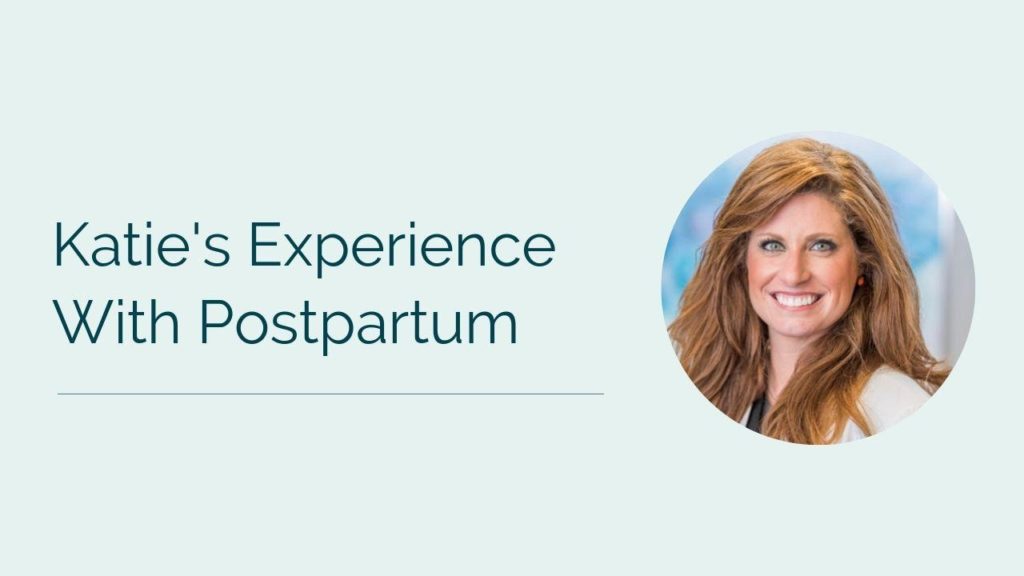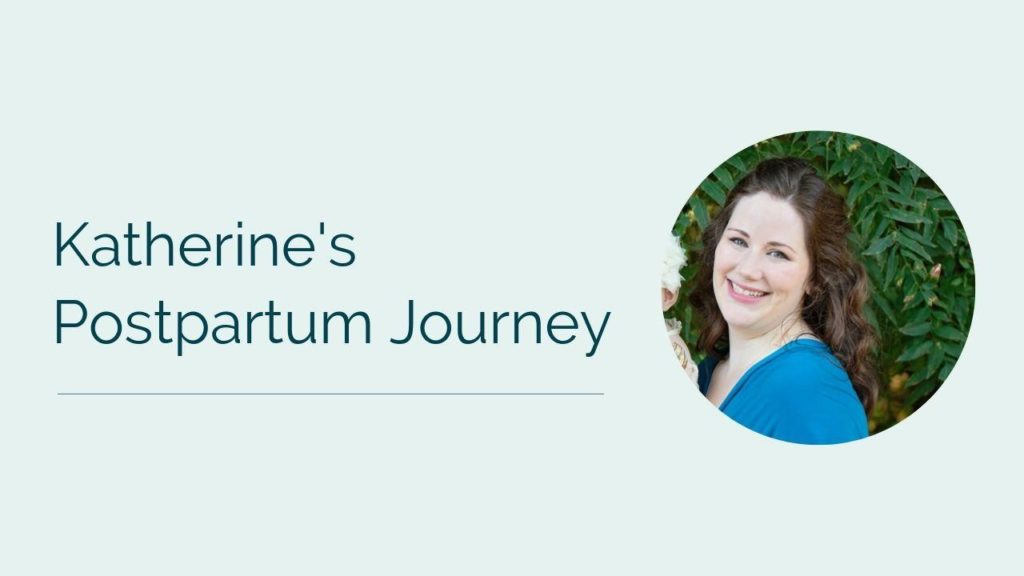With an average of 9 to 16 percent of moms experience postpartum depression (PPD), we find that having a strong community, where it’s safe to share even some of the darkest sides of pregnancy, has an astounding effect on helping moms get the help they need. Therefore, we take extra care when speaking to our patients about PPD during and after pregnancy.
Katie Neely, nurse practitioner at Walnut Hill, experienced PPD herself as a new mom. She is taking her experience with PPD, combined with her eight years of experience as a labor and delivery nurse, and is applying it to help our patients at Walnut Hill.
Here’s more about postpartum depression and how both Katie and Katherine, a patient of Walnut Hill, were able to open up and seek help for postpartum depression.
What is Postpartum Depression?
Postpartum depression is a mental health illness that affects women after giving birth. After childbirth, the hormone levels of estrogen and progesterone in a woman’s body quickly drop. This leads to chemical changes in the brain that may trigger mood swings and other depression-like symptoms.
If mood swings weren’t enough, having a newborn can cause sleep deprivation and the feeling of being overwhelmed, which can lead to exhaustion and contribute to the symptoms of postpartum depression.
“I tell people I had severe PPD, but it wasn’t to the point of mania to where I wanted to hurt my baby,” Katie says. “I had postpartum depression with extreme anxiety. I feel like a lot of people don’t realize there is a difference.
“I felt moody, irritable, and overwhelmed because I had so much love for my daughter and I would obsess over everything. When she would cry and I couldn’t make it better, it was the most awful feeling in the world.
“I’m happy the medical world is finally realizing PPD isn’t quite appropriate for different levels of PPD. Postpartum depression with anxiety is something I see a lot of in the office with my patients. Anxiety is a spectrum of postpartum depression, it’s just on the higher overwhelming anxiety side.”
Recognizing Postpartum Symptoms
Being able to recognize PPD symptoms is important for a mother’s health. You can get help faster and enjoy this chapter in your life if symptoms are spotted early.
While anxiety is a strong symptom of PPD, there are plenty of other symptoms you and your partner should be aware of:
- Depressed mood, excessive crying, or severe mood swings.
- Difficulty bonding with your baby or even withdrawing from family and friends.
- The inability to sleep, feeling restlessness, or sleeping too much.
- Having overwhelming fatigue, loss of energy, loss of appetite, and, in some cases, an increase in appetite.
- Reduced interest and pleasure in activities you used to enjoy.
- Intense irritability and anger.
- Feelings of worthlessness, shame, guilt, or inadequacy.
- Diminished ability to think clearly, concentrate, or make decisions.
- Severe anxiety and panic attacks.
- Thoughts of harming yourself or your baby.
- Recurrent thoughts of death or suicide.
Not every mom experiences PPD in the same way, and you should know some symptoms may be heightened or less noticeable in any PPD experience.
The Difference Between Baby Blues and Postpartum
Postpartum depression shouldn’t be confused with the baby blues, which are completely normal to have within the first few days or weeks after delivery. During this time, your body’s hormones normalize after the drop of hormones after delivery. It’s normal to feel emotional and a little scatterbrained.
Postpartum depression usually lasts far longer, and symptoms are much more pronounced. Typically, postpartum symptoms are so strong that medication and therapy are required to make you feel like yourself again.
“I highly recommend that moms wait at least two weeks after delivery to reach out when experiencing symptoms regular to baby blues,” Katie says. “If it lasts longer than two weeks, we can start monitoring and discussing future options to help with these symptoms.”
Postpartum Psychosis
Postpartum psychosis is a serious mental illness that can occur after childbirth and is different from the baby blues and postpartum depression. This illness can happen within the first three months after childbirth. Moms can experience symptoms of losing touch with reality and having auditory and visual hallucinations. Other symptoms may include agitation, anger, pacing, restlessness, and strange feelings and behaviors. Normally, treatment is urgent and may require a hospital visit.
New Developments to Prevent Postpartum During Delivery
With so many mothers experiencing PPD, a lot of research has been invested to find ways to prevent it. The doctors at Walnut Hill are at the forefront of researching PPD and how it occurs in some women and not others.
“There’s a theory that PPD occurs when the brain doesn’t tolerate the sudden drop of pregnancy hormones with the delivery of the placenta,” Katie says. “Doctors are studying a new medicine in IV form administered in the hospital, and it’s looking promising to help reduce the abrupt change in hormones with the removal of the placenta. The medicine slowly titrated those hormones down and, usually over 48 hours, hormones will be balanced to eliminate symptoms of PPD.”

Other Treatments for Postpartum Depression
Usually, to treat postpartum depression, we first listen to all your symptoms carefully and assess the severity of your PPD. In most cases, we recommend professional therapists for further help and will prescribe antidepressant medication such as Lexapro or Zoloft. These medications help increase serotonin levels and help balance hormones.
The medication isn’t meant to be taken for a long period of time, rather, it helps level hormones to where mothers can regain control of their coping skills and start to heal.
“I caution my patients that have a history of depression to be extra aware of their emotions throughout their pregnancy,” Katie says. “I’d rather them have a plan during pregnancy to manage their depression, instead of waiting several months for the symptoms to worsen and have to wait 6-8 weeks for a medication to kick in.”
When prescribing these medications, we discuss the risks and benefits with our patients. A common concern is if the medication will transfer through to breastmilk. A small amount will, but doctors and pediatricians have OK’d these medications to take while breastfeeding.
“The small risks to the baby outweigh the benefits of having a healthy, fit mother who isn’t suffering from depression,” Katie says.

Katie’s Experience With Postpartum Depression
Postpartum can be hard to address, especially for those who are closest to you and may notice something is off and may be reluctant to say something.
“Friends, family, and nurses called to check on me and I kept saying I was fine, but this was their way of telling me I needed help because they could see it and I couldn’t,” Katie says.
In fact, some moms experiencing PPD are functional and look like they have it all together on the outside, but they could be dealing with symptoms on the inside and ignoring the severity of the situation.
“My PPD was so bad that I would pace the floor for four hours the first month she was born. But, of course, I wouldn’t do that in front of people,” Katie says. “My husband didn’t even know I had it, he just thought I was moody. In reality, I wasn’t myself at all. I felt mad, guilty, and jealous on the inside.”
What’s worse is that many women feel guilty for having PPD, which makes it hard to speak up.
“I remember thinking, ‘Why did this happen to me. I wanted this baby—why do I have to feel this way?’” Katie says. “I also felt ashamed, like I was less of a mom and a woman because I know all of these wonderful career women who didn’t have to deal with these emotions, and it made me feel weak that I was experiencing these feelings.”
These factors play a role in moms who need help but never seek help until the situation becomes serious. This is why we can’t stress enough to speak with your doctor or nurse about what’s going on.
Walnut Hill Offers PPD Support For Patients
Katie takes extra care in noticing PPD symptoms in patients during regular visits. As a nurse practitioner, she will take the time to visit and help moms who seem to be struggling.
“When I’m counseling my patients, it can take up to an hour to even get to the root of the problem because it’s hard for moms to open up about PPD,” Katie says “I like to ask patients in the office, especially if their spouse is along with them, if they feel like they have lost their spouse or if they are acting like a different person. Normally if the answer is yes, they may need help.
“Sometimes I can tell someone is dealing with anxiety or depression by the look in their eyes. There’s a certain look that a mom has, and there’s even been a couple of patients I’ve picked out in the waiting room—-just by seeing the look in their eyes. Unfortunately, when you’ve been through it as bad as I have, I can recognize that look.”

Katherine’s Postpartum Journey
Katherine happens to be one of those moms that Katie was able to pick up on her postpartum depression symptoms and get her the help she needed.
“I found myself waiting in the waiting room, panicking on the inside while trying to hold it all together for the appointment,” Katherine says. “Katie could just feel it and, in the best way possible, didn’t let it go. She kindly started asking how I was doing and noticed something was off, and it all came spilling out. It felt so good to have my emotions validated, to know that what I was feeling was a normal experience and that there was help,” Katherine says.
During the first few months of postpartum, Katherine dealt with low milk supply, a tongue tie, breastfeeding problems, weight gain issues, and a dairy intolerance with her little one.
“I remember thinking, ‘Why hadn’t things gone well? Why was this so hard for me? Why was I not happy like all the other moms? Why did breastfeeding not work for us? Why had nothing gone the way I felt like it should go?’” Katherine explains.
Six months into motherhood, her daughter had a serious bat of bronchitis, which resulted in several doctor visits, a hospital visit, and continuous hurdles to get her baby well. During this period, nights were filled with fevers, tears, and emotional stress.
“We were in and out of the pediatrician trying antibiotics and a nebulizer. Nothing seemed to work—I was distraught. I remember being afraid every night I put her in her crib that I would wake up to a dead baby,” Katherine explains. “I remember feeling helpless and I was a useless mother because I couldn’t seem to heal my baby. I even remember having brief thoughts of wanting to just fall asleep and never wake up.”
The days following the hospital visit, Katherine’s daughter battled multiple ear infections. Katherine found herself always on edge, waiting in constant fear that her daughter would end up back in the hospital.
“I was so tired of having a sick baby that was always so fussy. I had no patience for my husband or work,” Katherine says. “I was always teetering right on the edge of anger. I just wanted to cocoon me and her in a bubble where nothing could touch us, and I could keep her from all the illnesses she seemed to constantly be contracting.
“My husband asked several times if I thought I had postpartum depression or anxiety. I read the symptoms and I kept thinking, No, this isn’t me. I didn’t have many other mom friends. Of the ones I did know, none of them seemed to struggle. I felt like I was on an island, isolated, and unable to help myself and along came Katie in a life raft.”
Healing From Postpartum Depression With Walnut Hill
After speaking with Katie Neely, she was recommended to a psychologist and started Lexapro, an antidepressant.
“By about two weeks of medicine and therapy, I felt like a completely new person,” Katherine says. “I am currently in the process of understanding and healing from the last year, but I am in a place where I feel capable of doing that. As cliché as it sounds, I feel like the sun has finally begun to shine on what was a stormy period in my life.
“Now I understand moms aren’t born overnight, and I am growing and learning to be a mom right alongside my baby,” Katherine says.
Speak Up About Postpartum Depression
Brave moms like Katie and Katherine share their stories in hopes to help more women recognize and seek help for their postpartum depression symptoms. Postpartum depression is a serious medical condition and we can provide our patients with hope and treatment.
Should you need a counseling referral or other support, we can connect you with specialists. The staff at Walnut Hill are full of compassion, and we are here to listen and help you get through this. Call us at (214) 363-7801 today to make an appointment.

